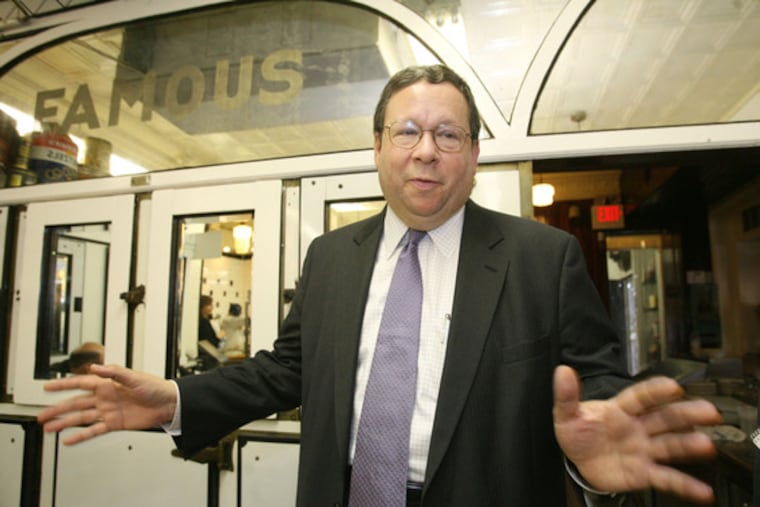PhillyDeals: Some precedent for Cohen's great power
Call him Mr. Philadelphia. David L. Cohen is a top executive at the city's biggest company, Comcast Corp.; the top spokesman for local business as chairman of the Greater Philadelphia Chamber of Commerce; a national political fund-raiser who still advises his old boss, Gov. Rendell; and as of last week, he's chairman-elect of the board of trustees of the venerable University of Pennsylvania, the city's largest private employer.

Call him Mr. Philadelphia.
David L. Cohen
is a top executive at the city's biggest company,
Comcast Corp.
; the top spokesman for local business as chairman of the
Greater Philadelphia Chamber of Commerce
; a national political fund-raiser who still advises his old boss,
Gov. Rendell
; and as of last week, he's chairman-elect of the board of trustees of the venerable
University of Pennsylvania
, the city's largest private employer.
Is this too much for one man?
"If you want something done, ask a busy person," says
Tasty Baking Co.
chief executive
Charles Pizzi
, a previous Chamber chair. "David never ventures in where he can't be successful."
Is it too much for Philadelphia?
"It's as if one strong figure from a very large corporation is finding a way of doing what every business group wants to do, which is cutting through all the impediments to achieve a larger vision of economic revitalization and success," said Rutgers-Camden urban historian
Howard Gillette
.
Unlike Pittsburgh, with its steel-and-banking Mellons, or Wilmington with its chemical du Ponts, Philadelphia has been an economically diverse place, where getting the business community to work together for sensible transportation, better schools, efficient health care, or anything more sophisticated than lower business taxes, has frustrated past activists.
Cohen's moment is also Comcast's moment. In Philadelphia, changes in leadership tend to follow changes in the economy, says Drexel University political scientist
Richardson Dilworth 3d
.
When Philadelphia was a manufacturing and railroad power, its leaders were famously Republican. Then Dilworth's grandfather became mayor as a Democrat in the 1950s reform movement, led by lawyers and backed by bankers.
The big banks vanished in mergers while Rendell was mayor in the 1990s, leaving a power vacuum that Comcast helped fill, as it has grown larger and more profitable, and into its new headquarters, the tallest building in Philadelphia.
"I'm pleased to see David and Comcast in a leadership role for our region now," not just the city, said
Hugh C. Long 2d
, another ex-Chamber chair who oversees commercial banking for Wachovia Bank between Virginia and Connecticut.
Comcast's influence is not absolute. The company failed to win state tax breaks for its headquarters after rival building owners protested and upstate Republicans balked. While Rendell discouraged Comcast competitors, City Council is now mulling
Verizon Communications Inc.
's plan to build a rival network.
What does Cohen want? He says his "No Excuses Agenda" for the Chamber is to boost state funding for city schools, and to encourage companies to hire and promote more young city residents, minorities and women.
In his day job at Comcast, which paid him $7.4 million in cash and stock last year, Cohen is the public face and strategist of a company engaged in tough battles with Washington regulators and corporate competitors.
At Penn, where he led the medical school and hospital board in reorganization and expansion before he was tapped for chairman, Cohen is charged with rallying trustees to keep the school growing at its West Philadelphia campus, despite the weak economy's toll on its $6 billion endowment.
Guian McKee
, a University of Virginia scholar and author of
The Problem of Jobs: Liberalism, Race, and Deindustrialization in Philadelphia
, sees some precedent for Cohen's multiple roles in the late Albert "Mr. Philadelphia" Greenfield, a hotel, retail and bank investor who helped bankroll the 1950s reformers.
"He amassed great power. He also had power outside the city, in the Democratic National Committee. And the movement which he championed had a unified agenda," like getting federal money for city projects. The city has a similar need today, McKee said.
"It's nothing new to have incredibly influential individuals in charge, behind the scenes," says Rutgers historian
Alison Isenberg
. But with Cohen, "it's all up front. You know what roles he's playing. The question is, what will he do with his influence? Does his agenda represent a true agreement for the future? And will people fall in line behind him?"
.